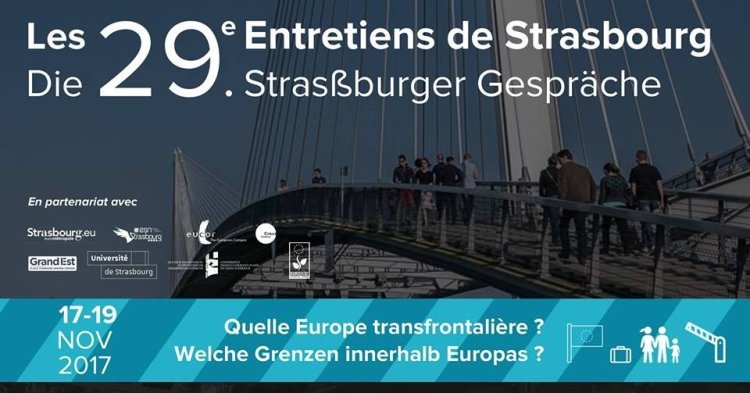An opening conference, several workshops, informal discussions and a pro-European and cross-border march from Strasbourg to Kehl, allowed the participants to think together about cross-border and migratory issues. Posted workers, cross-border workers, what rights, what differences? What migratory policy in Europe?
One of the common threads of this seminar was the European migratory policy. The opening ceremony gathered four experts:
– Alexis Vahlas, director of the Master in European Security at Sciences Po Strasbourg and political advisor of the Joint Operations Commands;
– Edouard Martin, French MEP for the S&D group in the European Parliament;
– Penelope Denu, assistant for the Secretary of the Committee on Migration, Refugees and displaced persons for the Parliamentary Assembly of the Council of Europe;
– Wolfgang Grenz, member of the Committee on Asylum for Amnesty International Deutschland.
The “management” of the migratory crisis in Europe: “a double shame” for the EU and its Member States
The conference brought up with no surprise that the management of the migratory crisis by the EU and its Member States reveals “a double shame”. On the one hand, regarding the human toll of the crisis, with the death of 15,000 migrants in the “cemetery of the Mediterranean” since 2014. On the other hand, because the management of the migratory crisis revealed a crisis of solidarity in Europe.
Alexis Vahlas highlighted that the European countries which are the most affected by the flows of migrants (Italy and Greece) are also the countries experiencing the most economic difficulties, and are not even the countries in which most of the migrants want to stay. Greece hosts one million migrants in its territory, which, compared to France’s population, would be equivalent to demand France to host 7 million migrants. This is not sustainable.
Facing this “unprecedented humanitarian crisis”, the EU proposed the Member States to stand in solidarity with Italy and Greece, by allocating 160,000 migrants between the 28 States. Not only is this number particularly low (and thus largely sustainable for EU countries), but the EU also takes into account the size of the country, its unemployment rate, its GDP and other relevant data.
Despite these guarantees, the proposal met with the refusal of the Council of the EU (one supplementary proof that crisis management by intergovernemental structures is rarely a good solution). France committed to hosting 36,000 refugees per year (namely one migrant by French municipality!), but by the end of the year, not even 12,000 refugees will be hosted…
“Africa: Europe’s policeman?”
The EU failed to enforce the system of distribution by quotas by all the EU Member States [1], and failed to have an efficient, fair and united asylum system.
The EU thus opted for another migratory policy, based on a system of “externalization” of the applications for asylum. Two examples were developed by the conference’s speakers: the “solution” that was found was the EU-Turkey deal on migrant crisis, signed in March 2016. It appears as a financial bargain of 3 billion euros given by the EU to Turkey to keep the refugees on Turkish territory, without the EU seem to care about the reception conditions (not to say detention conditions), as raised by Edouard Martin.
Penelope Denu also highlighted the difficulties encountered by Lebanon and Jordan, whose respectively 25% and 50% of the population are now refugees, whereas these countries’ wealth is much lower than the EU’s. This “externalization” appears extremely worrying.
Moreover, from November 2015, the European Commission created an “Emergency Trust Fund for Africa”, with the objective to support the development and stability of the countries of origin of the migratory flows. Concretely, this fund must allow a reduction of the migratory flows by providing a financial support to the countries of origin.
No one can deny that refugees (either economic, political, war or climate refugees) will continue fleeing from their countries as long as they will not be able to ensure worthy and stable life conditions. Supporting the development of these countries is thus a logic, laudable and justified commitment for the European Union.
However, supporting these countries in order to reject and delegate the management of its own external borders seems like a scandalous “European blackmail”, denounced by several NGOs, like the International Federation for Human Rights. The projects developed through this fund especially (if not primarily) concentrate on security and border control, and reveal a general confusion between migration, security and terrorism. European leaders, heads of State and of government, struggle to make no conflation between migration and terrorism on European territory. So why do they reproduce it on the other side of the Mediterranean?
Managing the EU migration crisis is urgent: the necessity to reform the Dublin system
Facing the disastrous management of the migratory crisis by the EU, it is legitimate to wonder if a legal and regulatory framework is in force. One exists: the Dublin Regulation (currently Dublin III), which appears today unable to solve the problems. The European Commission thus proposed a reform of the system: Dublin IV.
This reform would especially allow to take a weight off Greece and Italy and – hopefully – to put an end to externalization, by setting up a fair and equal system of the treatment of asylum claims between the EU Member States.
Indeed, the original Dublin system was not designed to ensure a sustainable sharing of responsibilities for asylum applicants within the EU. This has been evidenced by the migratory crisis. Indeed, according to the current Dublin system, the responsibility for examining an asylum claim lies with the Member State of first entry, explaining the pressure currently put on Greece and Italy.
The Dublin IV reform proposes the following: in case of an overwhelming number of asylum requests in one Member State, the new system will allow distributing the asylum seekers between all Member States that are not confronted with excessive pressure, and this by taking into account factors like the country’s wealth or rate of unemployment. One of the aims is also to have harmonized conditions of reception throughout the EU, both to ensure worthy conditions of reception, respecting the refugees’ fundamental rights, but also to avoid secondary movements of migrants, who tend to move to the Member States offering the best conditions of reception and of asylum.



Follow the comments: |
|
